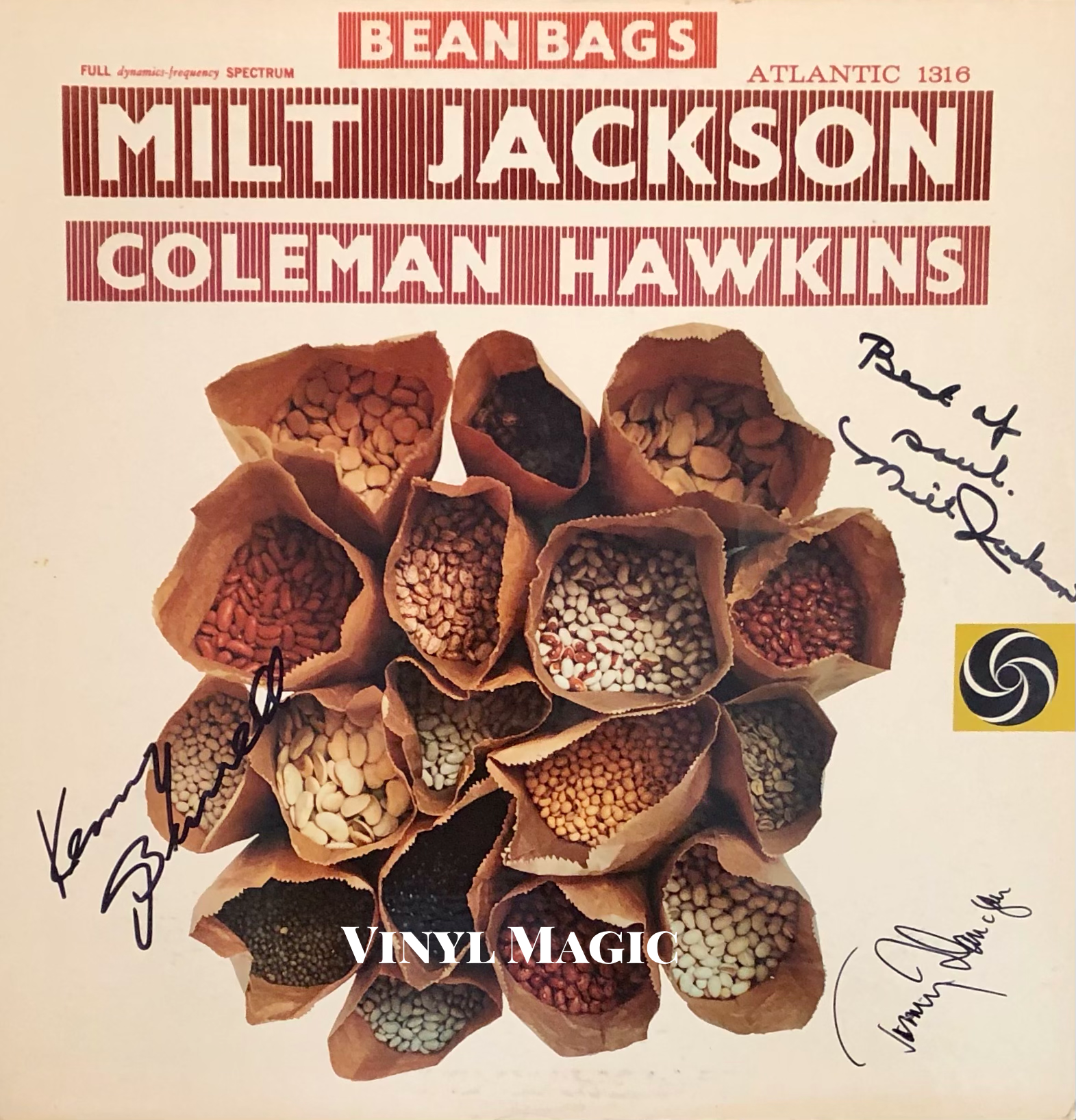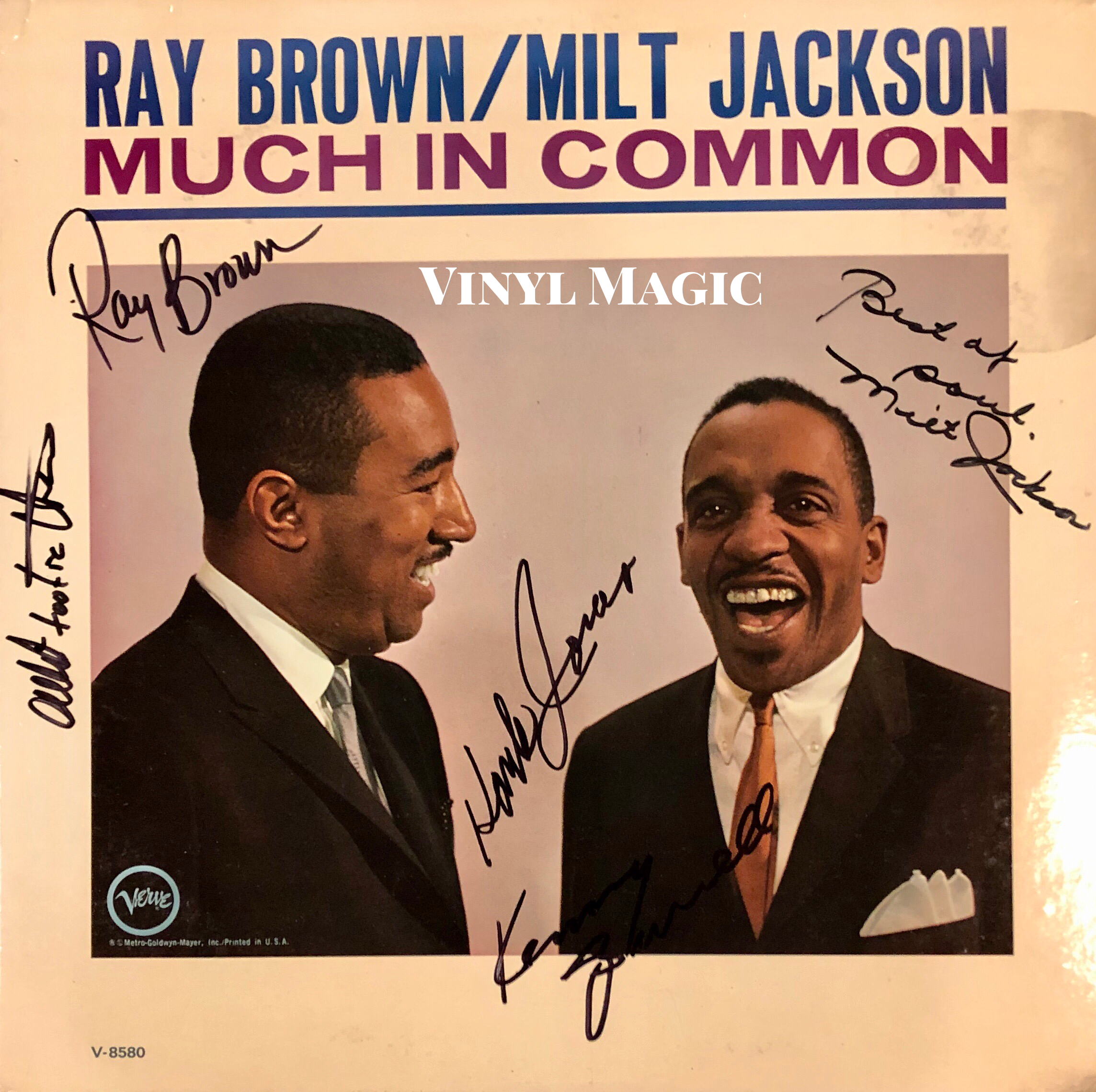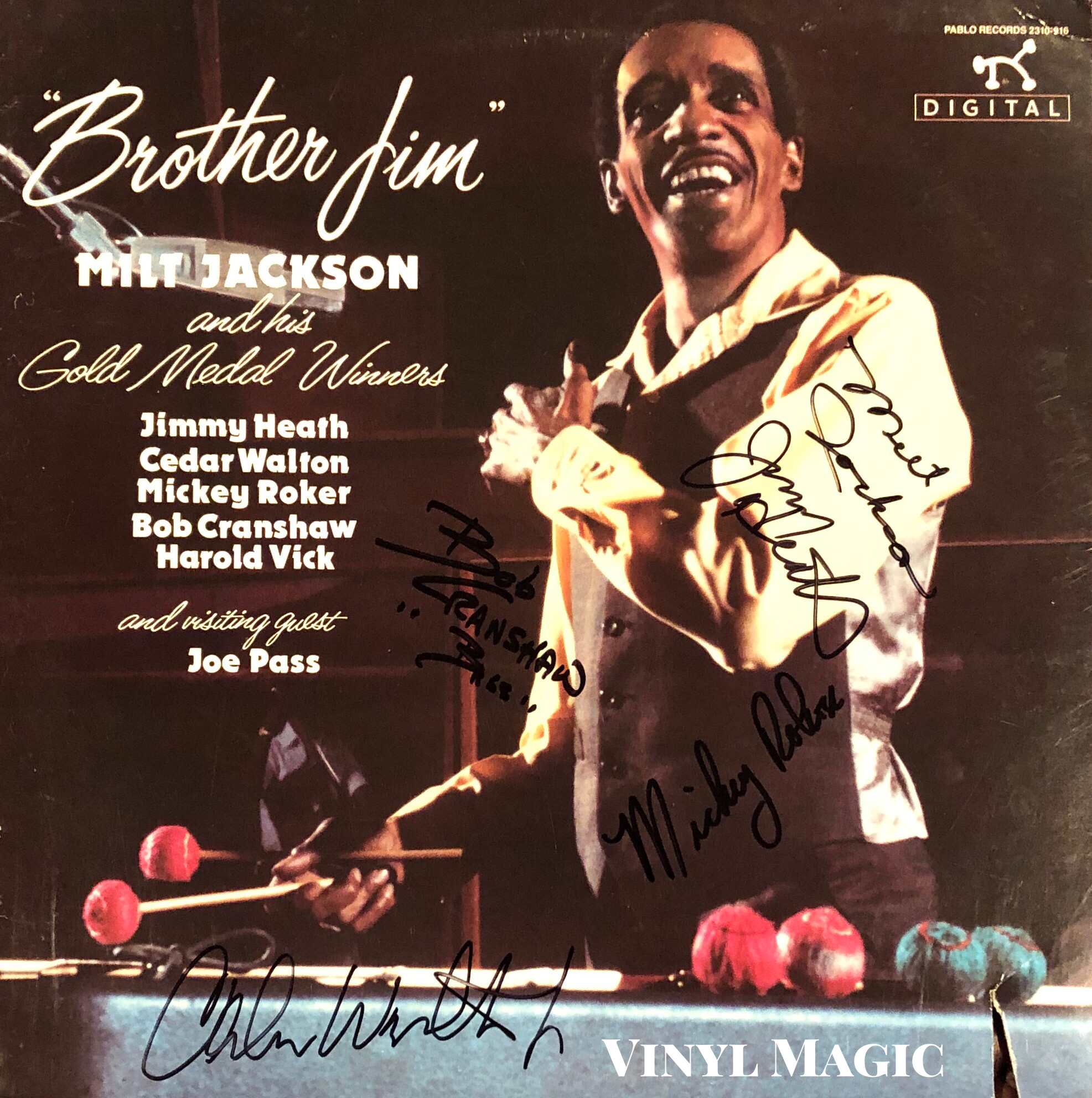Milt Jackson and Me...
Jackson’s=Ville (1956) signed by Milt “Best Of Soul”
Milt Jackson (1955) signed by Milt “Right On”
Milt never wanted to play the hard John Lewis pieces, but John would insist, like when we were in New York, saying that people wanted to hear this music. Milt was pissed, but John got his way. At the rehearsal, John gives me this book. Wow! I can’t even look up: I need to watch this motherf@&*er close. I get through the rehearsal OK, since in addition to the written parts, there was a lot of space and keeping time, thank goodness. Milt’s part, though, was ongoing the whole time. I didn’t see a single rest in that score! There was page after page after page of the sh#t. Milt looked at it once and put it away. We came back and played it that night. Milt was pissed at having to play this piece, but he didn’t miss a thing or play any wrong notes. This guy had the capacity to look at written music once and know it cold. Milt Jackson had a photographic memory and perfect pitch. He was a freak!
drummer Albert "Tootie" Heath
Soul Brothers (1957) signed by Milt
Soul Meeting (1961) signed by Milt
Bean Bags (1958) signed by Milt, Kenny Burrell, Tommy Flanagan
He is a naturally developed musician. He has perfect pitch, perfect time and perfect technique on vibes...On recording sessions, I never have to discuss or plan the swing and the feeling with Milt. I can feel him all the way, no matter what he's playing... His feeling takes him everywhere. In Paris, he went from club to club, playing vibes, piano, guitar, or if he couldn't sit in, just singing to himself. All because he breathes through music. He can't do without music. In Paris too, he played piano behind Sister Rosetta Tharpe and that was one of the listening balls of my life. Again, it was feeling that connected them.
Quincy Jones on Milt Jackson
The Ballad Artistry Of Milt Jackson (1959) signed by Milt
Bags & Trane (1959) signed by Milt, Hank Jones
Big Bags (1962) signed by Milt, Ron Carter, Jimmy Heath, Hank Jones, James Moody, Jerome Richardson, Willie Ruff, Doc Severinsen, Clark Terry
He came closer than anyone else on the instrument to making it sound like the human voice. It's a collection of metal and iron, and we don't have the ability to bend notes and make vocal inflections like a saxophone. But Milt played the instrument in the most organic way possible -- with a warm, rich sound. He set a precedent that this instrument can speak beautiful things, and that it's not just percussive.
vibraphonist Stefon Harris
Very Tall (1962) signed by Milt, Oscar Peterson
Live At The Village Gate (1963) signed by Milt, Albert “Tootie” Heath, Jimmy Heath, Hank Jones, Bob Cranshaw
Jazz ‘N’ Samba (1964) signed by Milt, Richard Davis, Tommy Flanagan, Jimmy Heath
Milt Jackson is simply the finest vibraphonist in jazz history, appearing on over forty albums with The Modern Jazz Quartet, more than sixty albums as a leader, and countless studio sessions. He is also a noted composer who wrote the jazz standards, "Bags' Groove", The Late Late Blues", "Bluesology", and he recorded with some of the greatest musicians: Ray Charles, John Coltrane, Miles Davis, Dizzy Gillespie, Coleman Hawkins, and Oscar Peterson to name a few.
Much In Common (1964) signed by Milt, Ray Brown, Kenny Burrell, Hank Jones, Albert “Tootie” Heath
Memphis Jackson (1969) signed by Milt, Ray Brown, Teddy Edwards, Harry “Sweets” Edison, Harold Land, Ernie Watts
That’s The Way It Is (1969) signed by Milt, Monty Alexander,, Ray Brown, Teddy Edwards
He is a virtuoso. Lionel Hampton and Red Norvo may have introduced the vibraphone to Jazz in the 1920s and 1930s, but Milt Jackson became the most acclaimed and influential practitioner from the 1940s onward. Milt began on piano and drums in his hometown, Detroit, Michigan, and by the time he was a teenager in high school, he could play piano, drums, guitar, violin, tympani, and vibraphone. Oh, and he even sang tenor in a professional gospel quartet, The Evangelist Singers. Apparently, Milt was a musical underachiever in every sense! Like so many musicians, Milt was deeply influenced by the church, as he once remarked, "Everyone wants to know where I got that funky style. Well, it came from church. The music I heard was open, relaxed, impromptu soul music."
Just The Way It Had To Be (1973) signed by Milt, Monty Alexander, Ray Brown, Teddy Edwards
Opus De Funk (1948 recordings, 1975 release) signed by Milt, Ron Carter, Tommy Flanagan, Jimmy Heath, Percy Heath
Montreux ‘77 (1977) signed by Milt, Monty Alexander, Ray Brown, Clark Terry
In 1945, Dizzy Gillespie recruited Milt to join his big band and Milt contributed to the classic bebop recordings, "A Night In Tunisia", "Anthropology", and "Two Bass Hit." The Modern Jazz Quartet, which had an incredible forty-three run, had its origins with the Dizzy Gillespie Big Band. The rhythm section - Milt Jackson, John Lewis, Ray Brown and Kenny Clark - would play an interlude between the big band sets. As Ray Brown explained, ''Dizzy had a lot of high parts for the brass in that group, so he said, 'I have to give these guys' lips a little rest during concerts, and while they're resting, you should play something.' '' The audiences loved it so much that they left to start the Milt Jackson Quartet in 1950, and then, the Modern Jazz Quartet in 1952 as Percy Heath replaced Ray Brown. When Connie Kay replaced Kenny Clarke in 1955, the MJQ personnel would remain intact until Connie's unfortunate stroke in 1992.
Jackson, Johnson, Brown & Company (1983) signed by Milt, Ray Brown, J. J. Johnson
Soul Route (1984) signed by Milt, Ray Brown, Gene Harris, Mickey Roker
All Too Soon (1980) signed by Milt, Ray Brown, Mickey Roker
Milt's genius was to transform the vibraphone into a bebop weapon for his brilliant improvisations. He set the oscillator to 3.3 revolutions per second, (fully three times slower than Lionel Hampton's 10 revolutions per second), and this gave his vibrato a subtle tone, all the better to showcase the blues which "Bags" loved so dearly. There was no one more swinging and bluesy than "Bags." He was nicknamed "Bags", it was said, after he showed up for a gig after a late night of revelry with his eyes bleary and swollen. I heard a different story. I asked Sonny, his tour manager who was also his brother-in-law, how Milt got his nickname. Sonny and I had become good friends through the years because I had seen Milt dozens of times in different incarnations - The Modern Jazz Quartet, The Very Tall Band with Oscar Peterson and Ray Brown, the Milt Jackson Quartet, et al. "It's not just the bags under his eyes," Sonny confided, "it's also for all the bags of dope he was holdin'. And he was always holdin'." That seemed infinitely more plausible to me.
Be-Bop (1988) signed by Milt, Jon Faddis, Jimmy Heath, J.J. Johnson, Mickey Roker, Cedar Walton
Brother Jim (1986) signed by Milt, Bob Cranshaw, Jimmy Heath, Mickey Roker, Cedar Walton
Feelings (1976) signed by Milt, Tommy Flanagan, Hubert Laws, Jerome Richardson
Each time I met Milt, he was kind and generous. His florid style on the vibraphone, voluble and effusive, effortlessly gliding his mallets over the keys with rapid and precise strikes, was in sharp contrast to his off stage demeanor. He was humble, self-effacing and shy. And he signed each album with a simple admonition: "Right On" or "Best of Soul."
Montreux (1975) signed by Milt
The Big 3 (1976) signed by Milt, Ray Brown
The last time I saw him at the Blue Note in November, 1998, Milt was playing a gig with Oscar Peterson and Ray Brown. The reconstituted Very Tall band was recording a live album, a follow up to their 1964 studio release. It was a terrific show and Milt, Ray and Oscar were in fine form. When Sonny brought me backstage, Milt laughed when he saw me. "Oh man, you again. You sure have a lot of albums", he said wearily. "It's not my fault you made all these great albums," I replied. He smiled and he signed and signed, finally, he got so tired, he signed a few without the requisite "Right On" or "Best of Soul." I thanked him for his kindness and said I would be back with another stack of vinyl soon. Unfortunately Milt passed away some ten months later, but what an impressive catalog he left, a jazz discography of peerless taste, style and sophistication.
Milt Jackson, the consummate jazz musician and soloist extraordinaire. Right on. Best of Soul.
In The Beginning (1948 recordings, 1991 release) signed by Milt
The Big Band Vol. 1 (1978) signed by Milt
Choice Milt Jackson Cuts (per BK's request)
https://www.youtube.com/watch?v=s8sBHp4o-FI
"Bag's Groove" - Modern Jazz Quartet
https://www.youtube.com/watch?v=7KDCe7X1l04
"Bag's Groove" - with Miles Davis, Thelonious Monk
https://www.youtube.com/watch?v=bCXnH2JhpEk
"I Remember Clifford" - with Benny Golson, Art Farmer
https://www.youtube.com/watch?v=mt8QrqdtRt0
"Hallelujah I Love Her So" - with Ray Charles
https://www.youtube.com/watch?v=BDYGgicuwFQ
"The Late Late Blues" - with John Coltrane
https://www.youtube.com/watch?v=-5u7TZhL22U
"Round Midnight" - Live Japan 1990
The Complete Milt Jackson (1969) front cover
Back cover signed by Milt





























